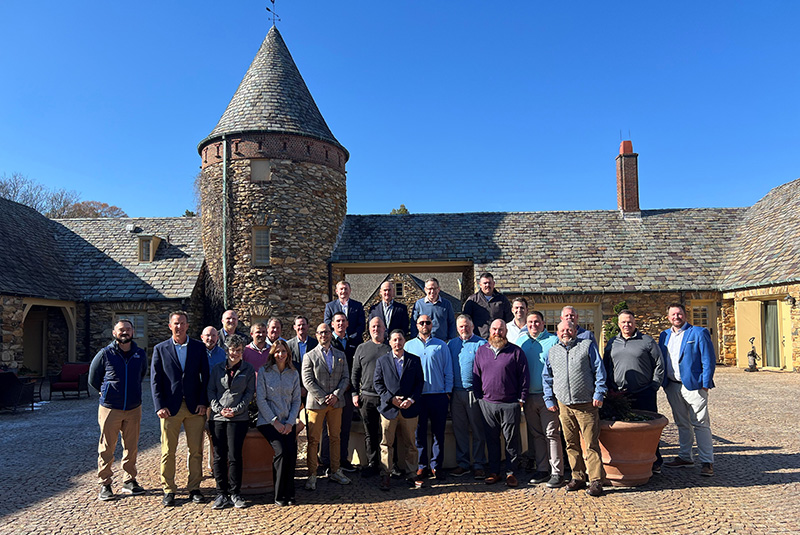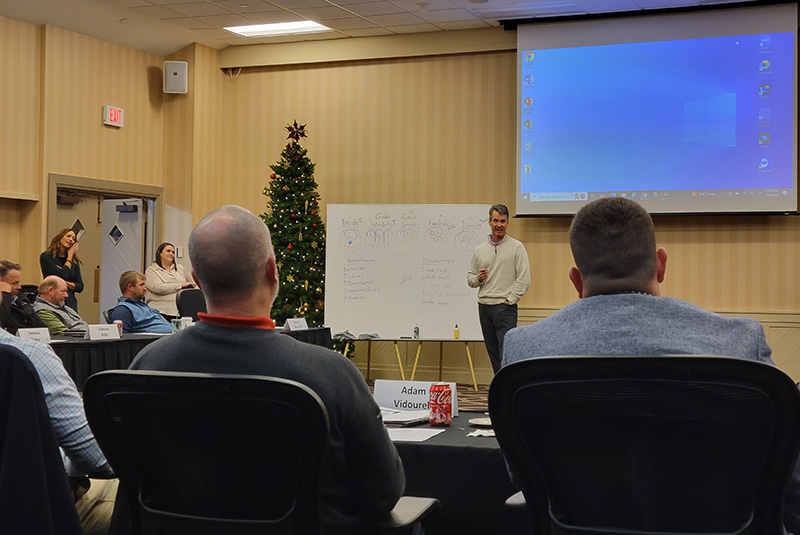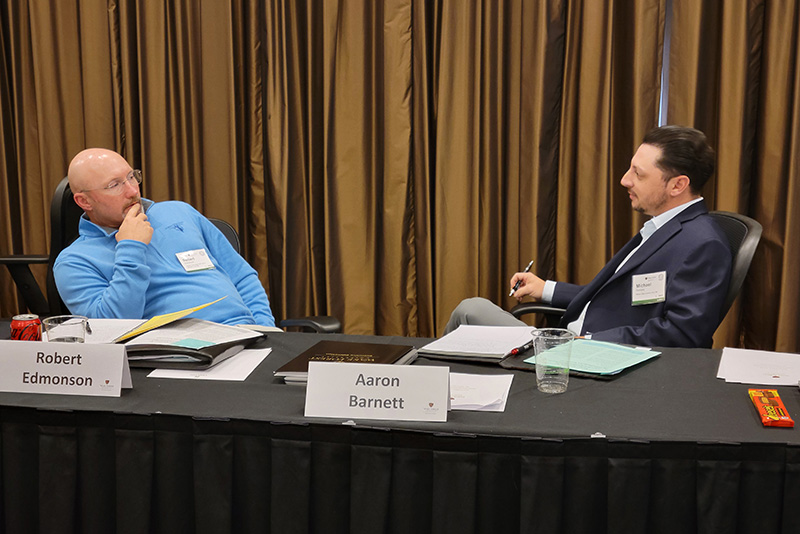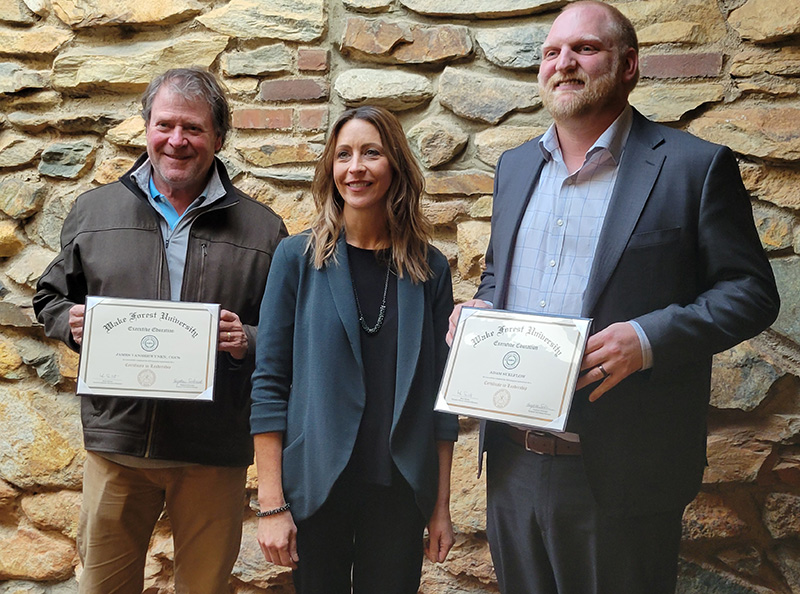
Golf course superintendents from around the country gathered at the Graylyn Estate in Winston-Salem, N.C. for the 16th annual Syngenta Business Institute. Photo courtesy of Mark LaFleur
Early in her Wednesday afternoon session at the 2024 Syngenta Business Institute, Amy Wallis — professor of practice in organizational behavior at the Wake Forest University School of Business — shared a story she’d heard from a former participant in the four-day professional development course for golf course superintendents.
A superintendent had several primarily Spanish-speaking Latino crew members. One member of the group emerged as a natural leader, someone respected and listened to by his teammates. As a result, the superintendent offered the crew member a promotion. He asked, would the man like to become a supervisor for that team? The employee’s answer, surprisingly, was no.
Why would that be?
One likely answer, Wallis offered, was that the employee came from a culture where a leader is viewed not as a peer or colleague, but as someone whose position demands deference. “Presumably, if he’d taken that job, he felt he would have been giving up his friendships and work community,” Wallis told the group. In this case, rather than take the promotion and raise, the man was happy to stay where he was.
A possible solution? Instead of putting that responsibility on the employee, Wallis suggested the superintendent might have had a better result if he’d asked the team to nominate a supervisor from within their ranks, thus eliminating some of the pressure of imposed leadership.
Wallis’ session on cross-cultural communication was one part of the education lineup of Syngenta Business Institute’s 16th iteration, held in partnership with Wake Forest University at the Graylyn Estate in Winston-Salem, North Carolina. 24 superintendents gathered to learn from Wake Forest business professors and executive educators about communication, work-life balance, leadership and decision-making, and the art of successful negotiation.

The education sessions at the Syngenta Business Institute are conducted by faculty at Wake Forest's Business School, and have evolved over time based on attendee feedback. Photos by Abby Olcese
Each year’s cohort gravitates toward a different aspect of the curriculum, and the participants of the class of 2024 were no different. Last year’s group found meaning in Dr. Julie Wayne’s session on work-life balance, a big issue for professionals whose workdays often stretch from 5 a.m. to midnight and beyond. This year’s superintendents seemed energized by Dr. John Sumanth’s Thursday afternoon session on negotiation, a hands-on segment featuring several exercises for the participants to test out and develop their skills.
While the exercises ranged from negotiating a business merger to large-scale real estate transactions, Noah Tubbs, superintendent at Glens Falls Country Club in Queensbury, N.Y., noted the skills involved had many practical applications related to his own career.
“Being better prepared, whether it’s contract negotiations or really anything in the industry, just having your ducks in a row makes a big difference,” said Tubbs, a 15-year GCSAA member.
Jake Scharmann, assistant director of agronomy at Highland Falls Golf Course in Las Vegas, agreed with Tubbs. “For me it’s about being more conscientious of your walk-away point in everyday life situations, not just negotiations,” he said, noting that the session helped him realize that setting personal limits was something he should think about more frequently. “Sometimes you apply for a job and think about that aspect more actively, but throughout the course of my career and daily operations, I don’t think about it as much,” said Scharmann, a seven-year GCSAA member. “I think it’ll be helpful to implement.”
Thursday night’s activities concluded with a series of roundtable discussions on topics including communication and employee recruitment and retention. One subject that was distinctly different from previous years was labor; unlike past cohorts, who had struggled with finding and keeping dedicated employees, this year’s group had generally found success using a variety of creative tactics. What these approaches most had in common: flexible scheduling.

Robert Edmonson, GCSAA Class A superintendent at Robert Trent Jones Golf Trail at Hampton Cove in Huntsville, Ala., and 23-year GCSAA member works through a negotiation exercise with Michael Dorosky, GCSAA Class A superintendent at Willow Oaks Country Club in Richmond, Va. and eight-year GCSAA member. Photos by Abby Olcese
Tubbs said Glens Falls created a three-week rotating schedule for summer employees that he said became an appealing recruitment tool. “I was concerned the quality of work might decrease, but it didn’t,” Tubbs said. “We went from 40% retention to 70% retention. We’re getting new applicants all the time.”
Of course, those benefits sometimes require sacrifice.
“We have extreme flexibility on hours, which works for the employees, but is hard on me to set it up,” said James VanHerwynen, CGCS, superintendent at South Hills Golf and Country Club in Fond du Lac, Wisc., and 34-year GCSAA member. “We also have an ‘Option Tuesday,’ since those days are usually slower on the course. You can sign up if you want the day off, eliminating your overtime potential for the week. But that also means the full-time crew can get more done on their own.”
Mark LaFleur, communications lead for turf & landscapes at Syngenta, said those observations and conversations he had during the event suggest that issues around labor are improving. “It’s a little less of a focus than it’s been in the past,” LaFleur says.
The Syngenta Business Institute is a program that evolves from the feedback of the participants. One example of that was Friday morning’s “Decision Making for Leaders” class, taught by Dr. Sherry Moss. That section was added to last year’s program and continued this year based on the positive response.
“I’m excited we added it,” LaFleur says. “The class this year seemed to really appreciate it.”

James VanHerwynen, CGCS, and Adam Suelflow, GCSAA Class A superintendent at Wisconsin Country Club in Milwaukee pose with their certificates alongside Stephanie Schwenke, turf market manager at Syngenta. VanHerwynen and Suelflow are both members of the Wisconsin GCSA.
LaFleur notes that many participants over the course’s 16-year history have said they only applied after they’d heard from program alumni that it was worth attending. While he’s grateful for the word-of-mouth success, LaFleur says he hopes future applicants don’t wait until they hear about it from someone else.
“Trust that Syngenta is really committed to the industry, and we know the more we invest in superintendents, the better the industry will be,” LaFleur says. “Don’t wait for someone to tell you they think you should go. Every year I ask the participants how it compares to their expectations, and every year they say it exceeds it. Invest in yourself and don’t wait for someone to tell you to apply.”
The program is a competitive one — several superintendents in this year’s cohort had applied multiple times before finally being accepted. LaFleur says applicants shouldn’t get discouraged if at first they don’t succeed.
“Keep applying and find ways to make yourself stick out as an applicant,” he says. “There’s a lot of common threads between superintendents, but each one as an individual has their own experiences that they bring to the class, and that makes it better.”
Abby Olcese is the online editor for GCM